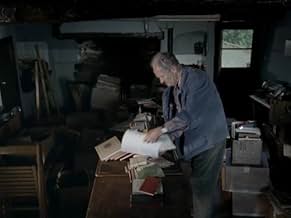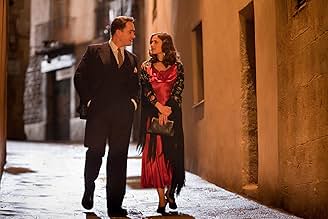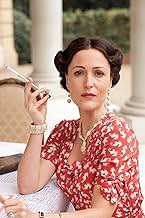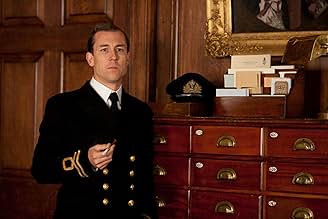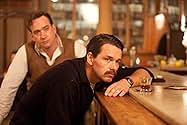Any Human Heart
- TV Mini Series
- 2010
- 1h 9m
IMDb RATING
7.8/10
2.4K
YOUR RATING
A novelist's life ricochets from 1920s Paris to '50s New York and '80s London. Along the way he meets Ernest Hemingway, Ian Fleming and the Duke and Duchess of Windsor - the exiled British k... Read allA novelist's life ricochets from 1920s Paris to '50s New York and '80s London. Along the way he meets Ernest Hemingway, Ian Fleming and the Duke and Duchess of Windsor - the exiled British king and his mistress Wallis Simpson.A novelist's life ricochets from 1920s Paris to '50s New York and '80s London. Along the way he meets Ernest Hemingway, Ian Fleming and the Duke and Duchess of Windsor - the exiled British king and his mistress Wallis Simpson.
- Nominated for 4 Primetime Emmys
- 5 wins & 16 nominations total
Browse episodes
Featured reviews
There's a section in the memoirs of the philosopher Bertrand Russell where he recalls an unexpected sexual encounter; he writes of it (in among weighty reflections on the meaning of life and the foundations of mathematics) with an almost puerile glee, like a child remembering being locked in the sweet shop. And there was something of the same tone - of baffled exultation, if you like - in a short story by the writer William Boyd, supposedly comprising a portion of the journals of a middle aged man called Logan Mountstewart (note the spelling), recounting a not dissimilar tale. Boyd must have enjoyed writing this, because a few years later he reconstructed the entire life of a renamed Mounstuart, in his novel 'Any Human Heart'. The author gave his character an accidentally interesting life, so that he happens to witness many key stories in 20th century history; but what really gives the book its quality is the believable nature of Logan's narrative voice.
As a television drama, it's not nearly so successful. Most obviously, Logan's own words are lost, leaving us the story without the commentary. In its place, tedious flashbacks, and scenes of an elderly Logan reviewing his life, just in case we had forgotten the plot. Secondly, television is a much less imaginative medium, and many drama series set over decades struggle to truly convey the passage of time. 'Our Friends in the North' was one that succeeded; this one does not. The random happenings in Logan's life no longer appear like chance events, retrospectively interesting, in a story driven by its own imperatives, but rather as implausible plot; instead of Logan making acquaintances who transpire to be famous, there's a feeling of shallow name-dropping (here he meets Hemmingway, there the Duchess of Windsor); and coincidences seem contrived when they're all there is. The background of ordinary life, behind which Boyd so successfully disguised his somewhat preposterous tale, is lost. I'm reminded of the disastrous television adaptation of 'A Dance to the Music of Time'; that was worse, as it compressed not one book but thirteen, but there's something of the same problem here. There are also other similarities, in the tale of an aristocratic writer in an where aristocracy is in decline. I didn't see the similarities when I read the book, but they are enhanced not just because of the televisual medium but for other reasons as well: the simplification of the character of Peter Scabius (making him an almost Widmerpool-style figure), and a reluctance to paint the world of Logan's youth in anything other than familiar 'Brideshead'-style colours. Related to the latter, the desire for a certain aesthetic has led the director to cast a stunningly beautiful woman in the role of almost everyone with whom Logan has an affair; the younger Logan is also very dashing, although the older Logan is allowed to age (he still has a final fling, however, with a very pretty French lady, and before that, with an attractive prostitute). While the original character had a messy personal life, there was never the feeling of perpetual glamour one gets when watching this production. To make it worse, we have to be shown Logan having sex with every one of them, an unimaginative and eventually tiresomely repetitive decision. What can be slyly implied in one line of a book becomes an endless succession of sweaty bodies, as if we couldn't be trusted to imagine it for ourselves.
This feels like a bitter review. But the book was good. It's become a series that is merely good looking; and sadly, utterly lacking in heart.
As a television drama, it's not nearly so successful. Most obviously, Logan's own words are lost, leaving us the story without the commentary. In its place, tedious flashbacks, and scenes of an elderly Logan reviewing his life, just in case we had forgotten the plot. Secondly, television is a much less imaginative medium, and many drama series set over decades struggle to truly convey the passage of time. 'Our Friends in the North' was one that succeeded; this one does not. The random happenings in Logan's life no longer appear like chance events, retrospectively interesting, in a story driven by its own imperatives, but rather as implausible plot; instead of Logan making acquaintances who transpire to be famous, there's a feeling of shallow name-dropping (here he meets Hemmingway, there the Duchess of Windsor); and coincidences seem contrived when they're all there is. The background of ordinary life, behind which Boyd so successfully disguised his somewhat preposterous tale, is lost. I'm reminded of the disastrous television adaptation of 'A Dance to the Music of Time'; that was worse, as it compressed not one book but thirteen, but there's something of the same problem here. There are also other similarities, in the tale of an aristocratic writer in an where aristocracy is in decline. I didn't see the similarities when I read the book, but they are enhanced not just because of the televisual medium but for other reasons as well: the simplification of the character of Peter Scabius (making him an almost Widmerpool-style figure), and a reluctance to paint the world of Logan's youth in anything other than familiar 'Brideshead'-style colours. Related to the latter, the desire for a certain aesthetic has led the director to cast a stunningly beautiful woman in the role of almost everyone with whom Logan has an affair; the younger Logan is also very dashing, although the older Logan is allowed to age (he still has a final fling, however, with a very pretty French lady, and before that, with an attractive prostitute). While the original character had a messy personal life, there was never the feeling of perpetual glamour one gets when watching this production. To make it worse, we have to be shown Logan having sex with every one of them, an unimaginative and eventually tiresomely repetitive decision. What can be slyly implied in one line of a book becomes an endless succession of sweaty bodies, as if we couldn't be trusted to imagine it for ourselves.
This feels like a bitter review. But the book was good. It's become a series that is merely good looking; and sadly, utterly lacking in heart.
8B24
I have not read the story on which the series is based. To the extent that the filmed version aims to represent historical fact in linking fictional characters to real ones, it is successful. Whether the linkage is correct or appropriate is another matter. Some of the filmed elements ring true, while others seem disjointed -- almost as if the scriptwriter intends to play with the viewer's mind. Non-linear storytelling is often like that, aiming for contrivance rather than narrative.
Taken strictly as theater on film, it is a highly entertaining piece of work. The camera pursues the protagonist (as played by three different actors) with a compassionate yet critical eye, inviting the viewer to pass judgment on his character by selectively picking out key episodes irrespective of logical development leading to foregone conclusion. This can be a sometimes gut-wrenching experience, not suited to lazy acceptance of questionable motivation on the part of a flawed hero.
To put it simply, if there is any moral to the story it pales by comparison to a theme of accidental and ineluctable passages in the life of a minor player on the stage of history, enhanced by backdrops of larger-than-life public figures and horrific events from the twentieth century.
Watch it for great acting and superb cinematic design rather than mere pleasure.
Taken strictly as theater on film, it is a highly entertaining piece of work. The camera pursues the protagonist (as played by three different actors) with a compassionate yet critical eye, inviting the viewer to pass judgment on his character by selectively picking out key episodes irrespective of logical development leading to foregone conclusion. This can be a sometimes gut-wrenching experience, not suited to lazy acceptance of questionable motivation on the part of a flawed hero.
To put it simply, if there is any moral to the story it pales by comparison to a theme of accidental and ineluctable passages in the life of a minor player on the stage of history, enhanced by backdrops of larger-than-life public figures and horrific events from the twentieth century.
Watch it for great acting and superb cinematic design rather than mere pleasure.
What a delicate human story of a real man and his very real and messy life, filled with all of the missteps into discovering the world and himself. While it is at once sentimental, it isn't overly romanticized or filled with self-pity.
A curious and fascinating sub-plot around the Duke and Duchess of Windsor, took me into an internet search to learn more around a historical incident involving all the characters.
Filled with flashbacks of Oxford friends, wives, lovers and children are the cast of characters illuminating our main character, Logan's, mind. Every flashback moves us through Logan's life, as he seems to outlive all of the unfortunate illnesses and accidents of his friends and family. The extensive ensemble of actors play their characters, with the grace and elegance you expect from such highly acclaimed actors as James Broadbent.
The real thread of sweetness, in this series, is seeing how we assign value to our relationships and perception of the world. This is a story for every person, to feel connected to their own humanness and find purpose and human connection at every stage of their lives.
A curious and fascinating sub-plot around the Duke and Duchess of Windsor, took me into an internet search to learn more around a historical incident involving all the characters.
Filled with flashbacks of Oxford friends, wives, lovers and children are the cast of characters illuminating our main character, Logan's, mind. Every flashback moves us through Logan's life, as he seems to outlive all of the unfortunate illnesses and accidents of his friends and family. The extensive ensemble of actors play their characters, with the grace and elegance you expect from such highly acclaimed actors as James Broadbent.
The real thread of sweetness, in this series, is seeing how we assign value to our relationships and perception of the world. This is a story for every person, to feel connected to their own humanness and find purpose and human connection at every stage of their lives.
An outstanding TV drama, superbly made and never less than engaging. The three-part ANY HUMAN HEART is in some ways a portrait of the 20th century, taking us through wars, political tribulations and the loneliness of modern times. Poignancy, romance, sex, death and drama, everything you could wish for in a show is present here.
The actors are excellent. Jim Broadbent embodies weariness and Matthew Macfadyen gives a career-best turn. Hayley Atwell is simply glorious, while Gillian Anderson deservedly won a BAFTA for her turn as the terrifying Wallis Simpson. The production values for this are top-notch and the story draws the viewer in from the very beginning. I repeat, outstanding.
The actors are excellent. Jim Broadbent embodies weariness and Matthew Macfadyen gives a career-best turn. Hayley Atwell is simply glorious, while Gillian Anderson deservedly won a BAFTA for her turn as the terrifying Wallis Simpson. The production values for this are top-notch and the story draws the viewer in from the very beginning. I repeat, outstanding.
William Boyd has shown himself to be one of the finest readers & chroniclers of the Human Condition writing today. It is almost a badge of honour that he has not won an award from one of the product placement companies. My first exposure to his work was a short-story called "The Persistence of Vision" - a perfect gem. Whenever I get depressed with the current offerings in the shops, I revert and, within seconds, I am transported. If I were to say that the life of Logan Mountstuart parallels my own to an almost spooky degree, it is not to say that I have played golf with some HRH & had my matches nicked. I have never jumped from an airplane or worked as a spy. One thing is certain: William Boyd is a far better writer than Ernest Hemingway ever was.
Today, like Logan Mountstuart, as I sort out photographs and ancient family papers, I find - often depressing - aspects of that earlier life, the appalling personal loss of a loved one, letters of despair. Here and there a picture drawn by a loved child.
As I said, Mountstuart is Everyman. He was not a bold boy; nor a bad man. He was easily led, but he is a good man; honourable, in a way that Peter Scabius was false. And so, Boyd leads us alongside this fallible man; while we, on occasion, find ourselves aching to say to him "Don't!" It would be better to read the book in the first instance; the screenplay follows the same sequence and one is more prepared for the jump-shifts in time. It is what I call a satisfying read; what I would like to write if I had the talent.
The acting is universally faithful to the characters, especially Matthew Mac Fadyean, who is utterly convincing & sympathetic.
If the producers are going to transfer this to DVD, please keep it intact, as they did in the excellent VHS version of "Armadillo" - which suffered badly in the compressed version, on DVD.
It is supremely gratifying to find that there is an audience who can relate to great drama; who have the patience to follow a complex storyline and debate its merits or otherwise. Sunday is going to seem empty when it ends.
Today, like Logan Mountstuart, as I sort out photographs and ancient family papers, I find - often depressing - aspects of that earlier life, the appalling personal loss of a loved one, letters of despair. Here and there a picture drawn by a loved child.
As I said, Mountstuart is Everyman. He was not a bold boy; nor a bad man. He was easily led, but he is a good man; honourable, in a way that Peter Scabius was false. And so, Boyd leads us alongside this fallible man; while we, on occasion, find ourselves aching to say to him "Don't!" It would be better to read the book in the first instance; the screenplay follows the same sequence and one is more prepared for the jump-shifts in time. It is what I call a satisfying read; what I would like to write if I had the talent.
The acting is universally faithful to the characters, especially Matthew Mac Fadyean, who is utterly convincing & sympathetic.
If the producers are going to transfer this to DVD, please keep it intact, as they did in the excellent VHS version of "Armadillo" - which suffered badly in the compressed version, on DVD.
It is supremely gratifying to find that there is an audience who can relate to great drama; who have the patience to follow a complex storyline and debate its merits or otherwise. Sunday is going to seem empty when it ends.
Did you know
- TriviaTobias Menzies and Sam Heughan also star in Outlander (2014) together.
- ConnectionsFeatured in The Wright Stuff: Episode #14.75 (2010)
Details
- Release date
- Country of origin
- Language
- Also known as
- Сердце всякого человека
- Filming locations
- Knebworth House, Knebworth, Hertfordshire, England, UK(the Earl's country estate)
- Production companies
- See more company credits at IMDbPro
Contribute to this page
Suggest an edit or add missing content


